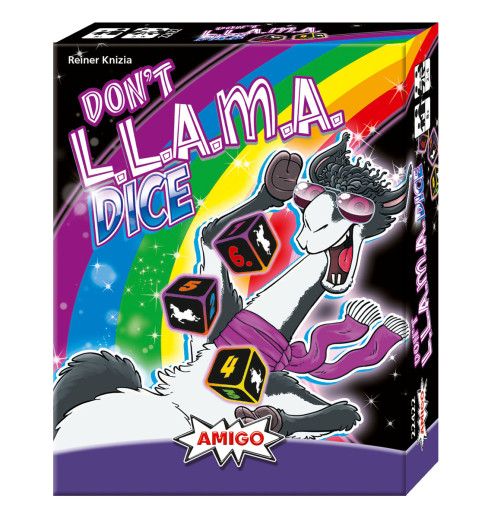We use cookies to make your experience better. To comply with the new e-Privacy directive, we need to ask for your consent to set the cookies. Learn more.
Don't L.L.A.M.A. Dice Game
SKU
040630
Grade 3-AD
These icons are designed to help you quickly understand and learn important information about our products.
Teaching Method
Traditional
Teacher-centered curriculum commonly used in classrooms that may include a text, teacher manual, tests, etc.
Charlotte Mason
A methodology based on the work of a 19th century educator who maintained that children learn best from literature (Living Books), not textbooks.
Classical
A methodology based on the Latin Trivium (three stages of learning), including the grammar stage (memorization and facts), logic stage (critical thinking), and rhetoric stage (developing/defending ideas).
Unit Study
A thematic or topical approach centered around one topic that integrates multiple subject areas.
Montessori (Discovery)
A methodology based on the work of a 20th century educator that emphasizes student and sensory-driven discovery learning and real-life applications.
Other
Other methodologies
Religious Content
Secular
Contains content contrary to common Christian beliefs (i.e. evolution).
Neutral
Avoids religious or theoretical topics or presents multiple viewpoints without preference.
Christian/Religious
Faith-based or including instructional religious content.
Learning Modality
Auditory
Learns through listening, talking out loud or reading out loud.
Visual
Learns through seeing, prefers written instructions and visual materials.
Kinesthetic/Tactile (Hands-On)
Learns through moving, doing and touching.
Multi-Sensory
Curriculum that employ a variety of activities/components.
Presentation
Sequential
Curriculum progresses through well-defined learning objectives. Emphasizes mastery before moving to the next topic.
Spiral
Topics and concepts are repeated from level to level, adding more depth at each pass and connecting with review.
Conceptual/Topical
Focus is on the “why,” often with a unifying concept as well as specific skills; coverage may be broader.
Teacher Involvement
Low Teacher Involvement
Student-led materials; parent acts as a facilitator.
Medium Teacher Involvement
A mix of teacher-led time and independent student work.
High Teacher Involvement
Teacher-led lessons; may utilize discussions, hands-on activities and working together.
Additional Materials Required
No other materials needed
Everything you need is included.
Other Materials Required
There are additional required resources that are a separate purchase.
Other Materials Optional
There are additional resources mentioned or recommended but are not absolutely necessary.
Consumable
Consumable
Designed to be written in; not reusable.
Non-Consumable
Not designed to be written in; reusable.
Our Price
$14.99 $14.99 $12.50
Rainbow Savings: $2.49
Warning
Choking Hazard
- Small parts. Not for children under 3 years.
Description
Players can test their luck with this entertaining dice game where you try to get the lowest number of points as possible. Each round a player is dealt six cards and has a chance to roll three dice. If the numbers on the dice end up matching with any numbers on the cards, then that player can remove those cards and will incur less points for that round. Players can quit a round whenever they choose, so be careful as a bad roll could end up leaving you with more points than you asked for! The game ends when a player has reached 40 points, for at that time the person with the lowest score wins. For 2-6 players with a playtime of about 20 minutes.
Publisher's Description of Don't L.L.A.M.A. Dice Game
Roll the dice and match them to the cards in your hand. If you can't you take a card from the center and add it to hand. Take negative points for leftover cards or if you can't draw any more cards-but give back chips if you win or roll three llamas! Win by having the fewest chips in the exciting dice version of our L.L.A.M.A card game.
Details
| Product Format: | Other |
|---|---|
| Brand: | Queen Games |
| Grades: | 3-AD |
| EAN/UPC: | 853533008742 |
| Length in Inches: | 4.75 |
| Width in Inches: | 3.625 |
| Height in Inches: | 1.25 |
| Weight in Pounds: | 0.35 |
Videos
Reviews

